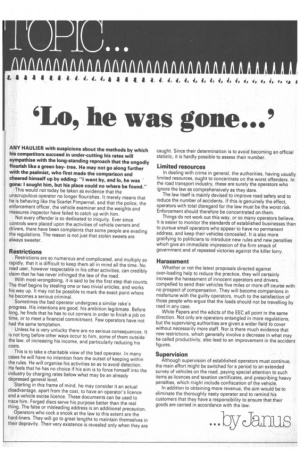'Lo, .he was gone... '
Page 90

If you've noticed an error in this article please click here to report it so we can fix it.
ANY HAULIER with suspicions about the methods by which his competitors succeed in under-cutting his rates will sympathise with the long-standing reproach that the ungodly flourish like a green baytree. He may not go along further with the psalmist, who first made the comparison and cheered himself up by adding: "I went by, and lo, he was gone: I sought him, but his place could no where be found."
This would not today be taken as evidence that the unscrupulous operator no longer flourishes. It merely means that he is behaving like the Scarlet Pimpernel, and that the police, the enforcement officer, the vehicle examiner and the weights and measures inspector have failed to catch up with him.
Not every offender is so dedicated to iniquity. Ever since controls were placed upon the activities of vehicle owners and drivers, there have been complaints that some people are evading the regulations. The reason is not just that stolen sweets are always sweeter.
Restrictions
Restrictions are so numerous and complicated, and multiply so rapidly, that it is difficult to keep them all in mind all the time. No road user, however respectable in his other activities, can credibly claim that he has never infringed the law of the road.
With most wrongdoing, it is said to be the first step that counts. The thief begins by stealing one or two trivial articles, and works his way up. It may not be possible to mark the exact point where he becomes a serious criminal.
Sometimes the bad operator undergoes a similar rake's progress. His intentions are good, his ambition legitimate. Before long, he finds that he has to cut corners in order to finish a job on time, or to meet a financial commitment. Few operators have not had the same temptation.
Unless he is very unlucky there are no serious consequences. It is not long before other ways occur to him, some of them outside the law, of increasing his income, and particularly reducing his costs.
This is to take a charitable view of the bad operator. In many cases he will have no intention from the outset of keeping within the rules. He will organise his activities so as to avoid detection. He feels that he has no choice if his aim is to force himself into the industry by charging rates below what may be an already depressed general level.
Starting in this frame of mind, he may consider it an actual disadvantage, apart from the cost, to have an operator's licence and a vehicle excise licence. These documents can be used to trace him. Forged discs serve his purpose better than the real thing. The false or misleading address is an additional precaution.
Operators who cock a snook at the law to this extent are the hard-liners. They will go to great lengths to maintain themselves in their depravity. Their very existence is revealed only when they are caught. Since their determination is to avoid becoming an official statistic, it is hardly possible to assess their number.
Limited resources
In dealing with crime in general, the authorities, having usually limited resources, ought to concentrate on the worst offenders. In the road transport industry, these are surely the operators who ignore the law as comprehensively as they dare.
The law itself is mainly devised to improve road safety and to reduce the number of accidents. If this is genuinely the effect, operators with total disregard for the law must be the worst risk. Enforcement should therefore be concentrated on.them.
Things do not work out this way, or so many operators believe. It is easier to monitor the standards of established businesses than to pursue small operators who appear to have no permanent address, and keep their vehicles concealed. It is also more gratifying to politicians to introduce new rules and new penalties which give an immediate impression of the firm smack of government and of repeated victories against the killer lorry.
Harassment
Whether or not the latest proposals directed against over-loading help to reduce the practice, they will certainly increase the harassment of innocent operators and drivers, compelled to send their vehicles five miles or more off course with no prospect of compensation. They will become companions in misfortune with the guilty operators, much to the satisfaction of those people who argue that the loads should not be travelling by road in any case.
White Papers and the edicts of the EEC all point in the same direction. Not only are operators entangled in more regulations, but the supervising authorities are given a wider field to cover without necessarily more staff. Nor is there much evidence that new restrictions, which generally involve a decrease in what may be called productivity, also lead to an improvement in the accident figures.
Supervision
Although supervision of established operators must continue, the main effort might be switched for a period to an extended survey of vehicles on the road, paying special attention to such items as licences and taxation certificates, and prescribing heavy penalties, which might include confiscation of the vehicle.
In addition to obtaining more revenue, the aim would be to eliminate the thoroughly nasty operator and to remind his customers that they have a responsibility to ensure that their goods are carried in accordance with the law.
...byJa-aus




































































































































